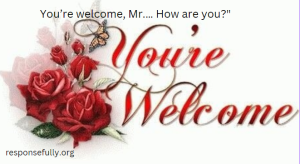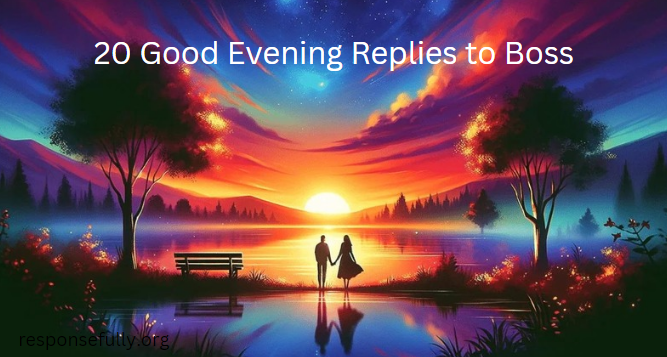Table of Contents
As your boss greets you with “good evening,” you might ponder the appropriate response, grappling with the balance of formality and emotion.
Maintaining effective workplace communication is vital for fostering positive relationships, particularly between superiors and subordinates.
Responding to your boss’s greeting with a courteous and composed demeanor can significantly enhance the rapport you share.
This article delves into several methods for responding to your boss’s “good evening,” whether in person, via email, or through text, providing comprehensive guidance for various scenarios.
Good Evening Replies to Boss
- You’re welcome, Mr.… How are you?”
- “Good evening, Mrs. I trust your day wasn’t too busy.”
- “Sir, it’s a pleasure to see you this evening.”
- “It’s a beautiful evening. Is there anything I can assist you with tonight?”
- “Hello, Miss…, welcome. If you need any assistance, please don’t hesitate to ask.”
- “Hello, Mr.… You’re looking sharp tonight.”
- “I’m doing well, boss. I hope you’re having a great evening.”
- “Thank you, Mr.… I hope you’re enjoying the evening as well.”
- “A very good evening, ma’am. Wishing you a delightful night.”
- “Thank you for checking in on me. I wish you a wonderful evening.”
- “Thank you, boss. Have a great night.”
- “Thanks for the email. See you tomorrow.”
- “Good evening, Mr.… Take care and relax.”
- “Beautiful evening, ma’am. I hope you have a peaceful rest.”
- “Thanks for your message. Have a good night’s sleep.
You’re welcome, Mr.… How are you?”
One of the finest ways to acknowledge your boss’s ‘good evening’ is by responding, ‘You’re welcome, Mr.…. How do you do?’ This reply exemplifies both courtesy and formality, making it an ideal response to a physical greeting. By using ‘Mr.’ or ‘Mrs.’ before their name, you convey respect. However, it’s important to gauge your boss’s preference regarding titles; while some prefer a casual first-name basis, others may prefer ‘sir’ or ‘ma’am.’ Additiona lly, asking how they are demonstrates politeness and concern for your superior’s well-being.”
lly, asking how they are demonstrates politeness and concern for your superior’s well-being.”
“Good evening, Mrs. I trust your day wasn’t too busy.”
“Another suitable response to your boss’s greeting is, ‘Good evening, Mrs.…. I hope your day wasn’t too busy.’ This formal reply not only acknowledges the greeting but also extends concern about their day.
Inquiring about their day is a thoughtful gesture, signaling your care and consideration. This approach is particularly effective if you haven’t interacted with your boss since morning. Whether they’ve been occupied with business matters or confined to their office, this response demonstrates your polite regard for their well-being, which is likely to be appreciated.”
“Sir, it’s a pleasure to see you this evening.”
“‘A lovely evening to you, sir. It’s wonderful to see you tonight,’ offers a warm and respectful response to your employer’s greeting.
While maintaining formality, this response also infuses genuine emotion. Recognizing that bosses are human too, capable of expressing and appreciating emotions, it’s perfectly acceptable to use kind and heartfelt language when addressing them.
Expressing delight in their presence when greeted with a ‘good evening’ demonstrates appreciation for their company, especially if they’ve been away attending to business matters.
However, it’s essential to be mindful of your boss’s preferences regarding titles like ‘sir’ or ‘ma’am.’ If they prefer a more casual approach, it’s best to omit such formalities.”
“It’s a beautiful evening. Is there anything I can assist you with tonight?”
“Another suitable reply to your employer’s greeting is, ‘A beautiful evening it is. Is there anything you need this evening?’
When your boss extends a ‘good evening,’ this response effectively acknowledges their greeting and offers assistance. Asking if they require anything demonstrates your preparedness to support them.
This response is particularly fitting if you serve as their assistant, secretary, or collaborate with them in any capacity. It reflects diligence and contributes to streamlining their tasks.
However, if you don’t have direct involvement in their work, this response may not be applicable to you.”
“Hello, Miss…, welcome. If you need any assistance, please don’t hesitate to ask.”
“Hi, Miss…, please feel free to reach out if you require assistance with anything.”
This response is suitable if you collaborate directly with your boss. Whether they’re returning from a business trip or just starting their day, this reply acknowledges their greeting warmly.
Asking if they need assistance is a courteous gesture that aims to facilitate their transition and support their tasks effectively.
“Hello, Mr.… You’re looking sharp tonight.”
Another favorable response to an employee’s greeting is, “Hello, Mr…. You’re looking sharp this evening.” This reply not only acknowledges their greeting but also compliments their appearance.
As previously highlighted, acknowledging the humanity of bosses can enhance rapport, and incorporating emotion into conversations is beneficial.
When encountering your boss for the first time in the evening, reciprocating with a compliment on their appearance can evoke positivity. Such affirmations may uplift their mood and potentially encourage a more emotive dialogue if they’re inclined.
“I’m doing well, boss. I hope you’re having a great evening.”
A fitting response when your employer inquires about your well-being is, “I’m doing well, and I hope you’re great?”
When your boss extends a good evening greeting and asks about your well-being, this response conveys that you’re doing fine.
Following up by asking how they’re doing is not only customary but also a gesture of care and fostering a good relationship with them.
However, if your employer prefers a different form of address rather than “boss,” remember to omit it and use the appropriate term.
“Thank you, Mr.… I hope you’re enjoying the evening as well.”
“Thank you, Mr.…. I trust you’re enjoying the evening” serves as another appropriate reply to your boss’s greeting.
Initially, this response expresses gratitude for their greeting, followed by inquiring if they’re enjoying their evening, fostering engagement.
It’s a formal yet confident response suitable for a face-to-face greeting, reflecting ease in communication with them.
Moreover, it can seamlessly transition into a reply to an email or text message.
“A very good evening, ma’am. Wishing you a delightful night.”
Another exceptional way to respond to your boss’ greeting is, “A very good evening, ma’am. Have a delightful evening.”
This reply not only acknowledges their greeting but also extends warm wishes for their evening. It is suitable for both in-person greetings and responses to emails.
This formal response can be used regardless of your relationship with your boss or their communication style.
“Thank you for checking in on me. I wish you a wonderful evening.”
Another suitable response to your employer’s greeting is, “Thank you for checking up on me. May your evening be wonderful.”
This response is particularly fitting when they send you a good evening email or text message to inquire about your well-being.
Not all bosses take the time to check on their employees, so receiving a good evening message from them warrants appreciation. Additionally, this response conveys gratitude and extends warm wishes for a beautiful evening to your employer.
“Thank you, boss. Have a great night.”
“Thank you, boss. Do enjoy the rest of the night” is another suitable response when your employer greets you.
This response is fitting whether the greeting is in person or via text or email. Particularly towards the end of the day or at the close of work, if your boss extends a good evening greeting, this reply expresses appreciation and wishes them a pleasant night.
It maintains a formal tone suitable for any mode of communication, including email responses.
“Thanks for the email. See you tomorrow.”
Another formal response to a greeting from your boss is, “Thank you for the email. See you tomorrow.”
This reply is appropriate when your boss sends a good evening email, expressing gratitude appropriately. The mention of seeing them tomorrow is a simple but effective way to convey well-wishes.
It serves as a straightforward response to their email, especially if you’re unsure what to say.
“Good evening, Mr.… Take care and relax.”
“Good evening, do take it easy, Mr.…,” is another suitable reply when your boss greets you with a good evening.
This response reciprocates their greeting while warmly conveying your concern for their well-being. Particularly if your boss tends to work long hours, this reply gently reminds them to prioritize self-care.
It’s an appropriate response, especially when you’re leaving for the day while your boss continues to work. When they extend a good evening greeting, this reply serves as a gentle reminder for them to rest.
Additionally, you can use this response in an email if they indicate that they’re still working, further emphasizing the importance of taking breaks and prioritizing their health.
“Beautiful evening, ma’am. I hope you have a peaceful rest.”
Another delightful response to your employer’s greeting is, “Beautiful evening, ma… I hope you rest well.”
This response is suitable for acknowledging your employer’s good evening message sent via text or email, extending well wishes for their evening.
Expressing a prayer for your boss holds significance, especially if they are religious, indicating genuine care and consideration. Thus, you can confidently employ this reply to convey your concern when your boss sends a good evening message.
Combining formality with emotion, it strikes a balance that resonates well in professional communication.
“Thanks for your message. Have a good night’s sleep.
When your boss offers a good evening greeting, it’s perfectly acceptable to blend formality with emotion. Whether you choose to compliment them, inquire about their well-being, or offer a prayer, there’s no harm in expressing genuine sentiments.
So, the next time you respond to your boss’s greeting, feel confident in utilizing any of the aforementioned replies. And don’t hesitate to craft your own response based on the situation and your relationship with your boss.
Frequently Asked Questions
Certainly! Here are some frequently asked questions and responses for good evening replies to your boss:
What is a polite way to respond to my boss’s good evening greeting?
“Good evening, [Boss’s Name]. I hope you had a great day.”
Is it appropriate to use emojis in my reply to my boss’s good evening message?
It’s best to keep your response professional, so it’s advisable to avoid using emojis when replying to your boss.
How can I express my appreciation for my boss’s greeting while remaining formal?
“Good evening, [Boss’s Name]. Thank you for your kind greeting. I trust you had a productive day.”
What if my boss sends a good evening email? How should I reply?
In response to a good evening email from your boss, you can say: “Good evening, [Boss’s Name]. Thank you for the email. I hope you have a pleasant evening.”
My boss often asks how I’m doing in the evening. How should I respond?
“Good evening, [Boss’s Name]. I’m doing well, thank you for asking. How was your day?”
Is it appropriate to wish my boss a good evening in return?
Yes, it’s polite to reciprocate with a wish for a good evening. For example: “Good evening to you too, [Boss’s Name].”
What if I want to express my gratitude and wish my boss a peaceful evening?
“Good evening, [Boss’s Name]. Thank you for your kind words. Wishing you a peaceful evening ahead.”
Conclusion
responding to your boss’s good evening greetings is an opportunity to demonstrate professionalism, courtesy, and warmth. Whether in person, via email, or text message, your replies should reflect respect for your boss while also conveying genuine sentiments. From expressing gratitude to wishing them well, there are various ways to respond effectively. Remember to maintain a balance between formality and emotion, considering your boss’s preferences and the context of the interaction. By choosing appropriate responses and engaging thoughtfully, you can foster positive relationships and contribute to a harmonious work environment.
